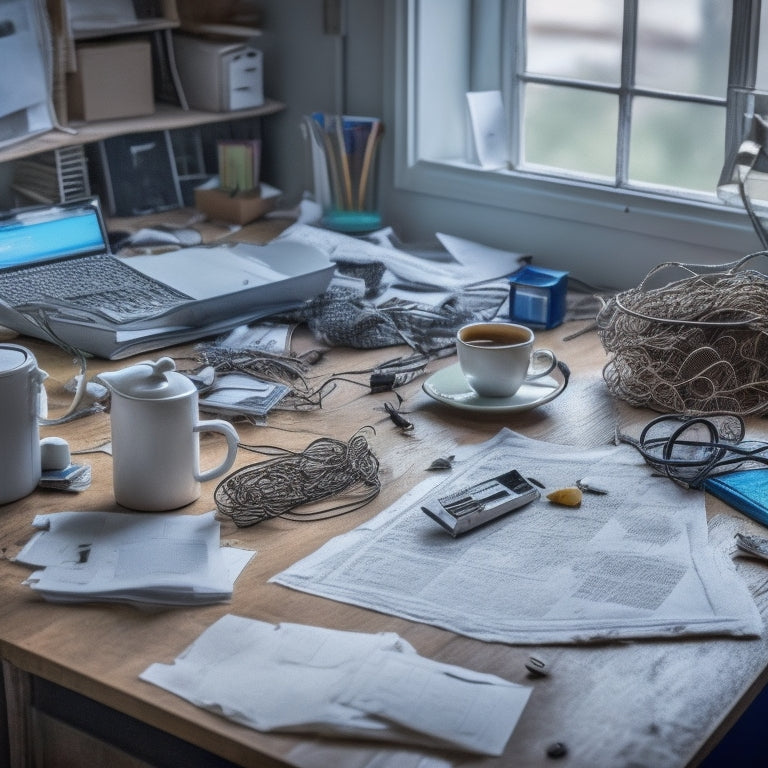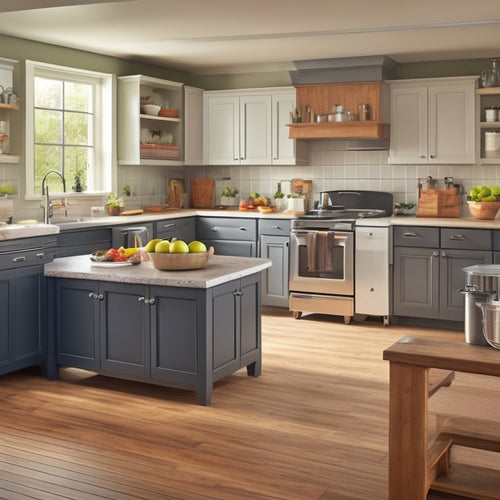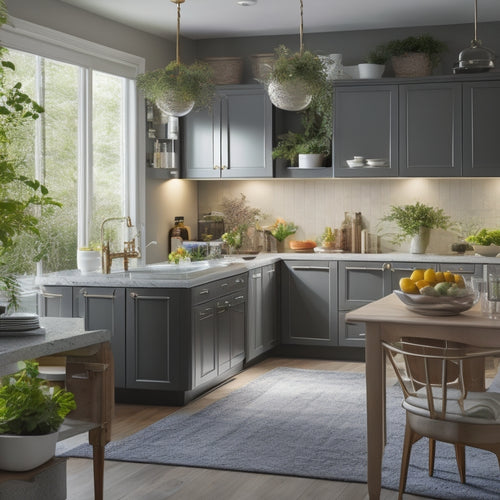
What's Hiding in Your Home Office Clutter?
Share
Your cluttered home office is harboring hidden dangers that are secretly sabotaging your productivity, mental clarity, and even your physical health. You're not just tripping over paperwork, you're tripping over your own peace of mind. Clutter is linked to decision fatigue, anxiety, and depression, making it harder to focus and stay motivated. By clearing the chaos, you can reclaim your workspace and access your full potential. You're just one step away from revealing the secrets to a clutter-free, stress-free, and highly productive home office - so what's holding you back from taking control?
Key Takeaways
- Hidden dangers like tripping hazards, fire risks, and decision fatigue are lurking in your home office clutter, waiting to be uncovered.
- Unsorted papers, forgotten office supplies, and dusty shelf clutter are common culprits contributing to chaos and disorganization.
- Emotional attachment to items can make decluttering difficult, but a minimalist mindset can help you focus and reduce distractions.
- Clutter can lead to emotional overwhelm, anxiety, and depression, making it essential to create a calm and organized workspace.
- Regular maintenance and daily tidying are crucial to preventing clutter from reaccumulating and maintaining a productive home office environment.
Hidden Dangers of Clutter
As you dig deeper into your home office, you're likely to uncover a ticking time bomb of clutter that's been quietly sabotaging your productivity and peace of mind. Clutter isn't just an eyesore; it poses serious health risks, mental stress, and productivity barriers.
You're wasting precious time searching for lost documents, and safety hazards like tripping hazards and fire hazards are lurking in the shadows. Decision fatigue sets in when you're overwhelmed by the sheer amount of clutter, making it harder to make decisions.
In addition, a clutter-free workspace enhances productivity through ergonomic setup and time management, and a logical filing system and decluttered digital spaces improve mental clarity and efficiency.
Emotional overwhelm can lead to feelings of anxiety and depression. Clutter is a significant distraction factor, making it difficult to focus on tasks.
Common Clutter Culprits Exposed
You know the usual suspects that clutter your home office, but it's time to confront them head-on.
Piles of unsorted papers, forgotten office supplies, and dusty shelf clutter are likely lurking in every corner, making it difficult to focus and be productive.
Piles of Unsorted Papers
Your desk is a minefield of paperwork, with stacks of unsorted documents threatening to topple over at any moment. It's overwhelming, and you're not sure where to start.
But, tackling paper organization is vital to reclaiming your workspace. Begin by categorizing papers into three piles: keep, shred, and file.
Implement sorting strategies like the "touch once" rule, where you handle each paper only once to reduce handling time. Designate a specific area for each category, and use folders or bins to keep them organized.
Set aside time each week to maintain your system, and watch your desk change from chaotic to controlled.
Forgotten Office Supplies
Forgotten office supplies lurk in every corner of your workspace, silently contributing to the clutter chaos. They're easy to overlook, but they're taking up precious space and distracting you from your priorities.
Take a closer look at your drawers, shelves, and cabinets. You'll likely find forgotten stationery, such as dusty notebooks, bent paper clips, and dried-out pens.
Then, there are the unused gadgets, like that fancy paper cutter you thought you needed or the label maker that never quite worked right.
Set aside some time to sort through these supplies and get rid of anything that's no longer useful or relevant. You might be surprised at how much more focused and productive you'll feel with a clutter-free workspace.
Dusty Shelf Clutter
Shelf clutter is a sneaky culprit that can quickly take over your home office. You mightn't even notice it creeping up, but before you know it, your shelves are packed with dusty trinkets, outdated books, and forgotten knick-knacks.
This clutter not only makes your space look disorganized but also contributes to dust allergies. It's time to take control! Start by clearing everything off your shelves and sorting items into categories.
Be ruthless – if you haven't used it in the past year, it's probably safe to get rid of it. Invest in shelf organization systems, like bins and baskets, to keep items contained and easy to access.
With a little effort, you can banish dusty shelf clutter for good and create a peaceful, productive workspace.
Decluttering for Productivity Boost
You're probably no stranger to feeling overwhelmed when surrounded by clutter in your home office.
Clearing the chaos is essential to freeing up space - both physically and mentally - so you can focus on what matters.
Clear the Chaos
As you begin the mission to change your home office, it's essential to tackle the overwhelming clutter that's suffocating your productivity.
You're not alone in this struggle - many people struggle with emotional attachment to physical items, making it hard to let go.
Start by taking everything out of your drawers and files, and sort items into categories. Be ruthless - if you haven't used it in the past year, it's probably safe to get rid of it.
Next, apply digital decluttering tips to your computer files and emails. Create clear folders and labels, and unsubscribe from unnecessary newsletters.
Free Up Space
Now that you've sorted through the clutter and purged unnecessary items, it's time to free up physical and mental space to enhance your productivity. Adopt a minimalist mindset and focus on what's essential for your work. This will help you stay focused and avoid distractions.
| Area | Before | After |
|---|---|---|
| Desk | Cluttered with papers and office supplies | Clear, with only necessary items within reach |
| Digital Files | Disorganized computer files and emails | Organized digital folders and labeled emails |
| Shelves | Overflowing with books and decorations | Tidy, with only essential resources and minimal decor |
| Mind | Overwhelmed by mental clutter and stress | Clear, with a sense of control and calm |
Organizing Essentials for Success
Several essential tools and strategies can make all the difference in your home office organizing process.
You'll need a label maker, file folders, and storage bins to categorize and contain your belongings. Invest in a comfortable, ergonomic chair and a desk with ample surface area to create a functional workspace layout.
A paper tray and inbox will help you stay on top of tasks and deadlines. Don't forget a wastebasket and shredder to keep unnecessary documents under control.
With these essential tools in place, you'll be better equipped to tackle your clutter and create a productive, stress-free work environment that helps you stay focused and in control.
Space-Saving Solutions Uncovered
You've set up your essential tools and strategies, and now it's time to optimize your home office space. A minimalist workspace is within reach with a few simple tweaks.
Start by maximizing your vertical space with wall-mounted shelves or storage units. This will help keep your floor and desk clear, creating a sense of calm and focus.
Next, get creative with storage by repurposing items like baskets, bins, or even old furniture. Consider investing in multi-functional pieces, like a desk with built-in storage or a file cabinet with a built-in shelf.
Maintaining Your Organized Space
Every day, a few minutes of maintenance can make a huge difference in keeping your home office organized and clutter-free.
You've worked hard to get your space organized, now it's time to maintain it. Start by setting aside a few minutes each day to tidy up and put away items that are out of place. This daily habit will help prevent clutter from building up again.
Effective time management is key to maintaining your organized space. Consider implementing digital organization tools, such as project management software or a task list app, to help you stay on top of tasks and deadlines.
Frequently Asked Questions
How Do I Declutter Sentimental Items Without Feeling Guilty?
When decluttering sentimental items, you're not erasing memories - you're curating them. Create a memory box for select keepsakes, and take photos of others before letting them go, allowing you to cherish the memory without the guilt.
Can I Organize My Home Office on a Tight Budget?
As you commence on a mission to tame your home office chaos, remember that budget-friendly solutions and minimalist strategies are your trusted allies. You can corral clutter without breaking the bank, converting your workspace into a haven of productivity and calm.
What's the Best Way to Organize Cords and Cables?
You're tackling the cord chaos! Start by categorizing cables by device, then employ cable management systems like cord organizers or zip ties to keep them tidy. Invest in storage solutions like cord concealers or cable boxes to hide the mess.
How Often Should I Review and Update My Filing System?
You should review and update your filing system every 3-6 months to guarantee it stays relevant and clutter-free, considering digital organization options to streamline your process and maintain a consistent filing frequency.
Can I Repurpose Items From Around the House to Organize My Space?
You can breathe new life into old items by repurposing containers and thinking creatively about storage. Look around your house for underused items that can be converted into functional organizers, and get ready to maximize your space with minimal spend.
Related Posts
-

Design Your Dream Closet With Online Software
With online software, you can transform your closet into a personalized retreat that reflects your unique style, effo...
-

DIY Island With Built-In Trash and Recycling Station
You're about to create a kitchen island that's both functional and stylish, with a built-in trash and recycling stati...
-

Why Corner Cabinets Are a Kitchen Essential
You're sitting on a goldmine of untapped storage potential in your kitchen - the often-wasted corner spaces that can ...


